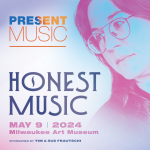One King, Six Royal Weddings
The early music movement appears to have turned away from the didactic and toward extra-musical narrative. Recently, Early Music Now has presented narrative programs about a journey of Sir Francis Drake and the diaspora of the Sephardic Jews. Saturday afternoon, EMN offered the Flanders Recorder Quartet, soprano Cécile Kempenaers and narrator Larry Rosenwald in The Six Wives of Henry VIII.
Rosenwald couched his narration in verse, some of it whimsical. He and Kempenaers occasionally donned foil crowns to indicate that they spoke as Henry and assorted wives. The text shifted to prose during these passages, as they were drawn from letters between the lovers. Henry could be very ardent and literary before he tired of his wives and divorced them or had them executed.
You would expect music from Henry’s court to fill the program. The king actually composed music, and the entire ensemble joined in a lusty, tabor-driven rendition of Henry’s Pastime with Good Company. Henry (1491-1547) might have heard Richard Nicholson’s Cuckoo, as Nicholson was a rough contemporary (but not in the wild-and-crazy version given Saturday, which included all sorts of barnyard noises from the soprano). William Cornysh’s Ah the Sighs (assuming it was William Cornysh the Younger) or some of the five anonymous works on the program might have reached the royal ears.
Selections by Jacob Van Eyck (Dutch, 1590-1657) and Heinrich Isaac (Flemish, 1445-1517) showed the Northern European school of counterpoint at its most sophisticated. The English music, by William Byrd (1540-1623) and William Wigthorpe (born c. 1570) sounded simple by comparison — but only by comparison. All of this music is first-class polyphony.
I wish the program book had been more forthcoming about the sources and arrangements. (I had look up the composers’ dates myself.) I’m pretty sure that the English stuff was mostly based on street tunes and arranged for home use by well-trained amateurs. Part-books could be sung, played with viols or recorders, or with some mix of singers and players. Tom Beets, Barth Spanhove, Joris Van Goethem and Paul Van Loey were free in their arrangements. With Cornysh’s Ah the Sighs, for example, Kempenaer sang the first verse unaccompanied. The quartet moved on to the anonymous Love Is Strange. Then both Ah the Sighs and Kempanaer returned for the second verse, this time with the quartet filling in the lush madrigal texture. That approach illuminated the way melodies stood alone originally and composers adopted them, even as it made for a neat little A-B-A cycle.
The players also appeared to be drawing on the English “divisional” practice (of adding rapid, virtuoso runs to divide the beat minutely over a repeating ground bass), notably in Preston’s Upon la mi re and Love Is Strange. At least, I think that’s what they were doing. The program gave no clues, and the narration all had to do with Henry and his women. The selections told us nothing about music of Henry’s time; they were chosen to make some emotional connection to the narrative moment. Some of them did.
I’m a little dubious about the narrative conceits of the program, but I can endorse the musicianship of the recorder players and singer without reservation. Kampenaers’ seamless, liquid, limpid soprano is a thing of great beauty. The Flanders fellows showed unwavering technical command and great verve and imagination in their phrasing.
They delighted the big crowd gathered at Schwan Hall at Milwaukee Lutheran College with two encores. The second was Moonlight Serenade, in which the recorder players gave a very credible reproduction of the Glenn Miller Orchestra’s saxophones. But if they really wanted to let their hair hang down, they would have chosen this as their encore.

















